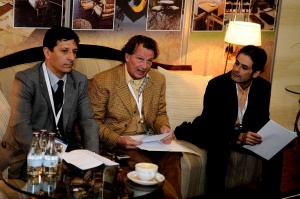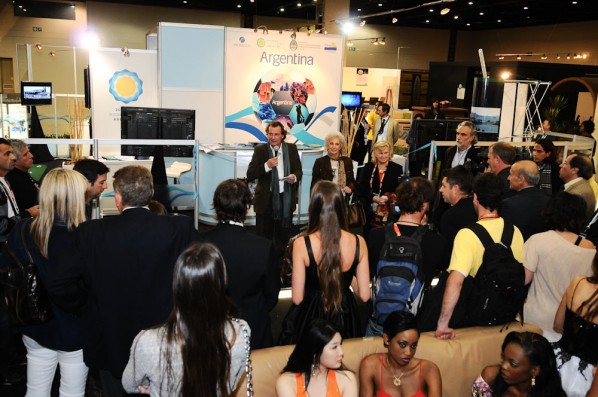Leading economist looks beyond football

Tomorrow’s World Cup match between Argentina and Greece will see the two sides battle it out for a place in the last 16. Off the pitch, however, the two nations share a similarity that runs deeper than football.
At a conference in Johannesburg organized by the embassy, which took place at World Football House, a leading Argentine economist pointed out how both countries have been hit by financial crises over the past decade – Argentina in 2001 and Greece this year – that share a number of similarities.
(Above, Carlos Quenan, Professor of Economics, Sorbonne; Carlos Sersale di Cerisano, Argentine Ambassador; Antonio Rodriguez, Chief Journalist, Spain)
Carlos Quenan of the Sorbonne said: “We are not just part of the World Cup group, but there is also a similarity, between the Greek financial crisis of 2010 and the 2001 crisis in Argentina.”
The teacher of the French Institute of Latin American Studies (IHEAL), noted three similarities between the two crises.
“Firstly, both Greece and Argentina have met major fiscal and external deficits that could no longer be funded by the market and raised the need for organized financing to avoid the lack of liquidity and insolvency” Quenan explained.
According to the economist, the second similarity is the rigidity of the exchange rate – with Argentina’s currency pegged to the dollar, and Greece the euro. This prevents devaluation to solve the problems of competitiveness.
Finally, in both cases, “the austerity measures lead to a recessionary spiral, with public spending cuts, which generate tax revenue falls and therefore runs behind a fiscal gap that it can close,” he added.
But the two crises also have two important differences: Greece qualifies for the European Union (EU) as a lender of last resort, while Argentina had no such luck, said the economist.

(Opening of Argentina House at World Football House with Argentine Ambassador Carlos Sersale making an address)
In addition, “Greece was the first of a series of crises that could occur in Europe. In the case of Argentina, it was the last cycle of crisis in emerging countries which began in 1997 and ended in 2001 and covered Asia, Russia, and Brazil. These factors play for aid to Greece,” he said.
For his part, Ambassador of Argentina, Carlos Sersale di Cerisano, highlighted the efforts made by his country since the crisis to recover and open new markets, especially within the southern hemisphere.
“You do not make political points against the lack of response of the northern hemisphere, but seek ways for southern hemisphere to compliment one another, such as Argentina and South Africa,” he added.
But the Argentine model will be difficult for Greece to apply. “They are in Europe. It will be more difficult to get out of that. In our case, Argentine exports to South Africa were $600 million in 2006. Today they are more than $1,000 billion,” said the ambassador.
Although both countries were hit by the crisis, it is unlikely that Tuesday’s match becomes an act of solidarity between Argentina led by Maradona, who is on the verge of securing their place in next round, whilst Greece needs a win to progress.

(Argentine football legend Ozzie Ardiles with Miss Argentina and David Falcon, Senior Vice President, World Travel Awards)
“In sport, everyone wants to win,” said the ambassador, who witnessed in 1994 in Boston, USA, the World Cup final match between the teams, won 4-0 by the ‘Albiceleste’.
“What matters is winning. That hope for the best for our team,” finally Sersale said.
Argentina House
Argentina is showcasing its unique attractions at the World Cup finals in Johannesburg, South Africa with a special exhibition dedicated to its tourism and cultural heritage, Argentina House.
Sandton Convention Centre – Johannesburg
Maude Street Sandton 2196,
Johannesburg, South Africa
14 June to 11 July

